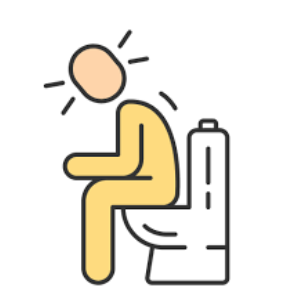Constipation
Constipation Treatment

What is Constipation?
Constipation are common digestive issues that can vary in severity and duration. Each condition has distinct symptoms and treatment approaches.
Symptoms
Infrequent bowel movements (less than 3 times per week)
Hard, dry, or lumpy stools
Difficulty or straining while passing stools
Feeling of incomplete evacuation
Abdominal bloating or discomfort
Nausea or decreased appetite (in some cases)
Needing to use manual maneuvers (e.g., pressing abdomen) to pass stool
Diagnosis
Medical History & Physical Exam:
Duration and pattern of constipation
Dietary habits, fluid intake, medications
Digital rectal examination (DRE)
Tests (if chronic or severe):
Blood Tests – to rule out thyroid issues, diabetes, etc.
Stool Test – to check for blood or infections
Colonoscopy or Sigmoidoscopy – to rule out structural issues or colon cancer
X-ray (Abdominal) – to detect stool build-up
Transit Studies (e.g., Sitz marker test) – to assess movement of stool through the colon
Anorectal Manometry – to evaluate rectal muscle function
Treatment
Lifestyle Changes:
Increase fiber intake (fruits, vegetables, whole grains – aim for 20–35g/day)
Drink plenty of water (6–8 glasses/day)
Regular physical activity
Do not ignore the urge to go to the toilet
Establish a regular toilet routine, preferably after meals
Medications:
Bulk-forming laxatives (e.g., psyllium husk)
Stool softeners (e.g., docusate)
Osmotic agents (e.g., polyethylene glycol, lactulose)
Stimulant laxatives (e.g., bisacodyl, senna) – short-term use only
Lubiprostone or Linaclotide – for chronic constipation or IBS-C
Other Interventions:
Biofeedback therapy – for pelvic floor dysfunction
Enemas or suppositories – for immediate relief in severe cases
Surgery – rare, used for structural abnormalities or severe chronic constipation
